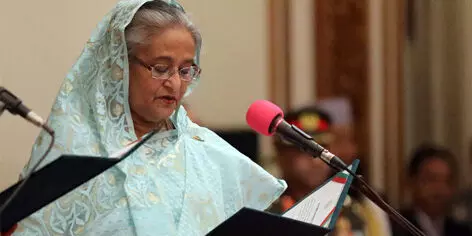
The subversion of democracy, a Bangladesh model
text_fieldsShutting down of ‘Dainik Dingal, the mouthpiece of Bangladesh’s main opposition party BNP the other day by the Awami League government suggests that the conflict between the ruling party and the opposition has taken an irreparable turn. The Hasina Wazed-led Awami League government, according to observers, is adding to the country’s smouldering political scene by blocking the publication of the main newspaper of the Opposition even as most of the media is owned by pro-government industrialists. Dainik Dingal, run by the Bangladesh Nationalist Party for more than 30 years, turns out to be the only vent for the opposition’s voice. The true nature of the Awami League government that clamours for democracy is revealed considering the fact that Bangladesh is ranked below India at 162nd position in media freedom in the list of Reporters Without Borders. Hasina Wazed's party, wrested power from the BNP-Jamaat-e-Islami Front government in 2009 after accusing it of supporting fundamentalists and rejecting secularism, maintained majority in the 2014 and 2018 elections by removing the constitutional clause that said polls should be held under the existing caretaker government. This was in effect a coup by the Awami League collaborating with the country’s business tycoons without allowing not only the media and the executive, but the judiciary either to function independently. Subsequently, Jamaat leaders, who had been acquitted of terrorism and treason charges having found no evidence even during the reign of Sheikh Mujibur Rahman the architect and hero of the Bangladesh liberation struggle, were sentenced to death and life imprisonment decades later on same charges through the fake tribunals. Because BNP leader Begum Khaleda Zia's greatest backing was her alliance with Jamaat-e-Islami. Strict restrictions were imposed on Jamaat activities alongside making it illegal for the party to contest elections. Begum Khaleda Zia has been imprisoned for a long time on charges of corruption. Hasina was encouraged to do so by the support of external forces.
But the situation has turned upside down. America is browbeating the government for curtailing freedom and the rule of law. The United States insists that media freedom should not be curbed and elections should be free. China that has no such compulsions does not insist any particular party to come to, or stay in power in Bangladesh. China wants strong ties with the nation no matter who is in power. India, on the other hand, is upset over the Hasina government's excessive subservience to China. After the 2018 elections, the Awami League administration has oriented itself more towards China. The Modi government sees it as detrimental to national interests. So, India is not watching from afar but instead trying to contain Bangladesh through active intervention. The RAW chief's recent visit to Dhaka must be deemed as the result of such planned moves.
Quite unlike in the past, the massive agitation organised by the BNP against the rising prices and economic crisis has shaken the Hasina government. The rally, started in Chittagong on October 8, 2022, disrupted eight cities and ended in Dhaka on December 10, 2022, with the participation of an unprecedented crowd defying all restrictions. The rallies raised demands including reducing prices of essential commodities and conducting free polls under the supervision of an interim government. BNP Secretary General along with hundreds of workers were arrested. Even as the Awami League government accused Western embassies in Dhaka of violating provisions of the Vienna Convention, they reportedly supported the rally. Though it may not accept the Opposition’s demands, the Awami League cannot afford to ignore the Chief Election Commissioner's warning that multi-party elections are not possible without the BNP. Awami League's intentions to return to one-party rule of 1972-1975 is difficult to implement even as figures show that Bangladesh has achieved more economic growth than India.





